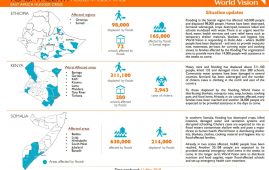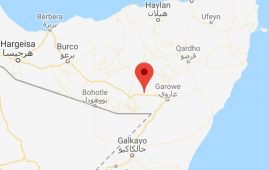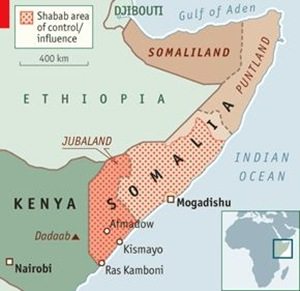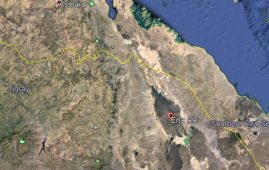Ethiopian Dep. Prime Minister and Minister of Foreign Affairs, Hailemariarn Desalegne, delivered a speech at the 66th Session of the United Nations General Assembly yesterday.
In his statement, Hailemariam Desalegne, in an apparent reference to the global financial crisis, remarked that:
The globalizing world has always presented challenges to Africa and the developing world. But the negative developments over the last few years, which appear to be far from being mitigated, have made it even more difficult for countries such as ours to move ahead on the path to development as fast as we would have liked and our potentials and our commitment would have allowed. There is a need for a redoubled effort so that the achievements of the MDGs would not be frustrated. That was also the hope of the fourth United Nations Conference on the LDCs. On our part, we feel we have been on truck on almost all the target and our commitment is to be even more ambitious in line with our five years Growth and Transformation Plan. But still, the global economic situation is a source of concern.
It is within this global context that the Horn of Africa has been hit by the worst adverse climatic condition in sixty years causing a very tragic drought situation. At this critical juncture the international community should be galvanized, particularly in assisting to alleviate the crisis in Somalia. The call made on Saturday at the Mini-Summit on this issue needs to be reiterated and amplified. We should do more for the people of Somalia and others in the region that have been affected by the calamity.
He went to stress that the role of poverty as a denier human rights and criticized the snail-paced efforts on climate change. Hailemariam said:
What is even more crucial in the Horn of Africa is sustainable development. Our youth need to have their hope for the future not frustrated; and the condition of our women and children require much greater attention. Poverty, on top of denying people their human rights, is also not a solid foundation on which peace and security can be built. This need compels us to draw attention to a number of challenges that we in the IGAD region face, particularly with respect to climate change. The adverse consequences of climate change are becoming evident in a variety of ways. The challenges are global, requiring global solutions on the basis of common but differentiated responsibility. We don’t believe enough is being done which is commensurate with the gravity of the danger to humanity in general. Moreover, the whole issue embodies injustice because Africa and the developing world happen to be the worst affected while contributing the least to climate change.
Though the word Eritrea was conspicuously absent in the speech, the following paragraph was nothing but a stern criticism of the Security Council for failing to take stronger measures against that country. He said:
I need not go into the details of what the lGAD countries have requested the Security Council in terms of support for them to succeed in the effort they are making for peace in Somalia and to contain those who not only encourage, but also take part in carrying out terrorism. It is particularly vital for the Council to act on conclusions and recommendations made by a body established by the Council itself. Sweet talk, devoid of any behavioral change in practice and on the ground, should not lead the Security Council to wish away concrete evidence presented to it by a committee of its own creation.
Let us admit, Mr. President, there is double standard in the fight against terrorism. Our counter terrorism effort cannot succeed if we are selective in this struggle. The Prime Minister of India could not have been more correct when he said from this podium last Saturday, “There cannot be selective approaches in dealing with terrorist groups or the infrastructure of terrorism. Terrorism has to be fought across all fronts.”
We in Ethiopia have never had a short-sighted perspective on what we need to do to ensure our national interest and our national security is protected. In this day and age, it is only through collective effort that we can ensure peace, security and stability. Some might imagine that they would benefit by encouraging discord in their neighbourhood. The Horn of Africa has suffered because of policies emanating from that kind of mind-set for too long. This should be combated. We seek the support of all fair-minded people in this endeavor. On our part, what we have been guided by has been the objective of protecting and defending the collective security interest of the people of our region. It is this which has guided our policy in Sudan and in the effort we have been making to nurture mutual confidence between us and both the Republic of Sudan and the new nation of South Sudan. This has also been the sign-post we have followed in conducting our policy with respect to Somalia.
The Dep. Prime Minister was referring to the incriminating report issued by the Security Council’s Monitoring Group on and Eritrea, last August, and to the requests made by IGAD, the Horn of African regional grouping, for more sanctions on the Eritrean regime. [See: UN report on Eritrea’s plot to bomb AU summit and IGAD calls for more sanctions on Eritrea [full text] also the Eritrean Terrorism Archive in this blog.]
In conjunction, Hailemariam did ask for ‘the support of all member States of the United Nations noting that IGAD countries will be submitting a draft resolution requesting observer status to IGAD at the United Nations.
Concerning the Palestinian bid for statehood, Hailemariam commented:
Ethiopia wants to express its position on the historic turning point that the people of Palestine and the people of Israel are passing through and the challenges they are facing. We are convinced that no great wisdom is required to realize that at the end of the day, it is only through peaceful negotiation and mutual accommodation that the two parties can reach the final destination. In this regard, it is not enough that the right of the Palestinians to a viable state of their own is acknowledged and given lip-service to. It is also necessary that real, tangible and practical steps are taken, and in good time, towards the realization of that objective. This has not been done, No doubt, this is partly the explanation for where we are today and at this moment, On the other hand, while it is self-defeating and also unjust to use it as a pretext for delaying the realization of the dreams of the people of Palestine, nonetheless, it is neither proper nor realistic to underestimate and belittle the security concerns of Israel, When the time comes for us to pronounce ourselves on this signature issue of the 66th session of the Assembly, the position we will be taking will be based on an objective assessment of all dimensions of the issue in good faith and in line with what we believe the cause of justice and sustainable peace, dictates.
Read the full text of the speech below.
*************
Statement by H.E. Hailemariarn Desalegne,
Deputy Prime Minister and Minister of Foreign Affairs of the Federal Democratic Republic of Ethiopia
At The General Debate of the 66th Session of the United Nations General Assembly
26 September 2011
New York
Mr. President,
It gives me great pleasure to congratulate you on your election to preside over the 66th session of the General Assembly. Please rest assured of the full cooperation of my delegation in the successful discharge of your high responsibilities. I would also like to express our appreciation to your predecessor for his excellent stewardship of the last session of the .General Assembly. Mr. President, please allow me to take this opportunity to once again congratulate Secretary-General Ban Ki-moon on his reelection for the second term and express our admiration for a work well done during his first term.
It is with a great sense of brotherhood that I warmly welcome the Republic of South Sudan to the family of our global organization. I extend our sincere felicitation and best wishes to the newest Member State, the Republic of South Sudan.
Mr. President,
The globalizing world has always presented challenges to Africa and the developing world. But the negative developments over the last few years, which appear to be far from being mitigated, have made it even more difficult for countries such as ours to move ahead on the path to development as fast as we would have liked and our potentials and our commitment would have allowed. There is a need for a redoubled effort so that the achievements of the MDGs would not be frustrated. That was also the hope of the fourth United Nations Conference on the LDCs. On our part, we feel we have been on truck on almost all the target and our commitment is to be even more ambitious in line with our five years Growth and Transformation Plan. But still, the global economic situation is a source of concern.
It is within this global context that the Horn of Africa has been hit by the worst adverse climatic condition in sixty years causing a very tragic drought situation. At this critical juncture the international community should be galvanized, particularly in assisting to alleviate the crisis in Somalia. The call made on Saturday at the Mini-Summit on this issue needs to be reiterated and amplified. We should do more for the people of Somalia and others in the region that have been affected by the calamity.
What is even more crucial in the Horn of Africa is sustainable development. Our youth need to have their hope for the future not frustrated; and the condition of our women and children require much greater attention. Poverty, on top of denying people their human rights, is also not a solid foundation on which peace and security can be built. This need compels us to draw attention to a number of challenges that we in the IGAD region face, particularly with respect to climate change. The adverse consequences of climate change are becoming evident in a variety of ways. The challenges are global, requiring global solutions on the basis of common but differentiated responsibility. We don’t believe enough is being done which is commensurate with the gravity of the danger to humanity in general. Moreover, the whole issue embodies injustice because Africa and the developing world happen to be the worst affected while contributing the least to climate change.
We members of IGAD have been trying for some time to bring our collective effort to bear on the various challenges the Horn of Africa faces. Realizing that one of the major factors hindering development in our region has been related to security and lack of durable stability, we have continued, apart from doing our best to lay the basis for the integration of our sub-region through various project related to infrastructure, to strengthen our common endeavor for peace and security in the IGAD region. The positive outcomes are there to be seen. No regional group has been as closely identified with peace-making in the Sudan as IGAD has been. In Somalia, in close collaboration with the East African Community, the AU and the UN, IGAD has been the linchpin in the effort to assist the people of Somalia achieve peace, stability and national reconciliation. Now, with the extremist and the Al-Shabab having been driven out of Mogadishu and the tide turning against them, there is new hope in Somalia which should be sustained. The Kampala Accord has laid the basis for breakthrough in Somalia for which we owe gratitude to President Musiveni and Ambassador Mahiga, Special Representative of the Secretary-General.
Mr. President,
Let me take this opportunity to pay tribute to Uganda and Burundi for the sacrifices they have made, and continue to make, as the two countries that are spearheading the efforts of AMISOM to keep at bay those like AI-Shabab and their supporters. It must be underlined, that this is a fight which has humanitarian and developmental implications, not only security or political.
That is why the successful cooperation of the lGAD countries for stability and security in the Horn of Africa, and in the fight against terrorism and extremism, has been so vital and needs the wholehearted support of the international community, the General Assembly, and most particularly, the Security Council.
I need not go into the details of what the lGAD countries have requested the Security Council in terms of support for them to succeed in the effort they are making for peace in Somalia and to contain those who not only encourage, but also take part in carrying out terrorism. It is particularly vital for the Council to act on conclusions and recommendations made by a body established by the Council itself. Sweet talk, devoid of any behavioral change in practice and on the ground, should not lead the Security Council to wish away concrete evidence presented to it by a committee of its own creation.
Let us admit, Mr. President, there is double standard in the fight against terrorism. Our counter terrorism effort cannot succeed if we are selective in this struggle. The Prime Minister of India could not have been more correct when he said from this podium last Saturday, “There cannot be selective approaches in dealing with terrorist groups or the infrastructure of terrorism. Terrorism has to be fought across all fronts.”
We in Ethiopia have never had a short-sighted perspective on what we need to do to ensure our national interest and our national security is protected. In this day and age, it is only through collective effort that we can ensure peace, security and stability. Some might imagine that they would benefit by encouraging discord in their neighbourhood. The Horn of Africa has suffered because of policies emanating from that kind of mind-set for too long. This should be combated. We seek the support of all fair-minded people in this endeavor. On our part, what we have been guided by has been the objective of protecting and defending the collective security interest of the people of our region. It is this which has guided our policy in Sudan and in the effort we have been making to nurture mutual confidence between us and both the Republic of Sudan and the new nation of South Sudan. This has also been the sign-post we have followed in conducting our policy with respect to Somalia.
Mr. President,
Ethiopia is not a new comer to international diplomacy. As a founding member of the United Nations, we take our responsibility as members of the human family, seriously. We view our vocation to be a factor for strengthening international peace and security and for enhancing friendly relations among nations, big or small, on the basis of full equality. That is why, as we continue to call for the reform of the Security Council, we remain also devoted to the revitalization of the General Assembly, the true representative of the people of the world in the true spirit of the United Nations Charter whose very first phrase is "We the peoples of the United Nations … "
It is also in this same spirit that Ethiopia wants to express its position on the historic turning point that the people of Palestine and the people of Israel are passing through and the challenges they are facing. We are convinced that no great wisdom is required to realize that at the end of the day, it is only through peaceful negotiation and mutual accommodation that the two parties can reach the final destination. In this regard, it is not enough that the right of the Palestinians to a viable state of their own is acknowledged and given lip-service to. It is also necessary that real, tangible and practical steps are taken, and in good time, towards the realization of that objective. This has not been done, No doubt, this is partly the explanation for where we are today and at this moment, On the other hand, while it is self-defeating and also unjust to use it as a pretext for delaying the realization of the dreams of the people of Palestine, nonetheless, it is neither proper nor realistic to underestimate and belittle the security concerns of Israel, When the time comes for us to pronounce ourselves on this signature issue of the 66th session of the Assembly, the position we will be taking will be based on an objective assessment of all dimensions of the issue in good faith and in line with what we believe the cause of justice and sustainable peace, dictates.
Mr. President,
We are passing not only through a period of uncertainty, but also great historic and momentous change. The world that came out of the Second World War is almost no more, Periods such as this one need to be handled delicately. That is why it is so critical that more attention is paid to the need to the prevention of conflicts and to mediation. We are pleased that the President of the 66th session has made this, one of his top priorities. We want to assure him that from the JGAD countries what he should expect is our full cooperation. Let me conclude by asking the support of all member States for the draft resolution that IGAD countries will be submitting requesting observer status to IGAD at the United Nations.
I thank you
***********************




1 Comment on this post
Comments are closed.
Leave a Comment